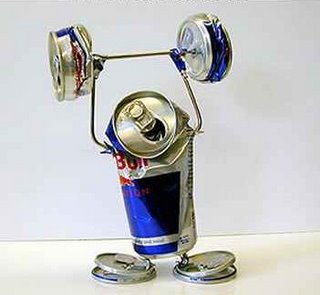 Once upon a time, a villager went to see his local witchdoctor.
Once upon a time, a villager went to see his local witchdoctor.
"Doctor, " he said. "I'm really stressed out. My hut is a mess, and my kids drive me crazy. My wife doesn't understand me. I..."
"Stop," the witchdoctor said. "Do you have a goat?"
"Of course I have a goat," the villager said. "Doesn't everyone have a goat?"
"Some people don't. Do you take good care of your goat?"
"Yes," the villager said. My oldest kid feeds her every day. "
"Where does your goat sleep," the witchdoctor asked.
"In her goat pen," the man answered.
"Your goat is the problem. She needs to sleep in your hut at night. Before the sun goes down, bring her in from the pen and give her a place in your hut." And with that, the witchdoctor looked down and went back to work skinning bats.
The villager left, and that night the goat went into the house.
A week later, the man went back to the witchdoctor.
"The goat is driving me crazy!" the man yelled. "What were you thinking? She kicks over the soup, she poops on the beds, her hoofs are cutting up the dirt floor. I haven't gotten a good night of sleep all week."
"Fine," said the witchdoctor. "Get the goat out of your hut. Come back and see me tomorrow."
The next day the man came in and said "Witchdoctor, thank you. I had the best sleep last night. The kids didn't fight, the soup was delicious, and my wife and I cleaned the hut together, and then we went to bed early. What a difference!"
"Your welcome," said the witchdoctor. "Pay my wife on the way out."
Saturday, October 28, 2006
The Lesson of The Goat
Posted by
"old dog"
at
00:07
0
comments
![]()
Friday, October 27, 2006
I Found God

Now I'm hiding while He counts.
Sitting in the park on a warm Fall day watching the 4 year old and the baby play, it's difficult to think of reasons to go away for military training, maybe even go to war. Yet, at home, where I have a limited ability to think straight, I can think of so many reasons to leave.
I've been waiting to go to the MEPS, the Military Enlistment Processing Center, for my physical. My recruiter and I went to a local military base to get a "prior service" physical with the National Guard medics. They wanted nothing to do with it, as I had listed Mitral Valve Prolapse on my paperwork. They said to take it to MEPS. Recruiter sent off to the Air Force for my medical records, but only the enlistment inspection records came back. So we'll be doing paperwork that does not list it and let MEPS find it and figure out what to do.
Stupid paperwork. I finally have a date to go to MEPS, though, next Thursday. I'll be leaving on Wednesday night and getting checked into a hotel for the night so that I can get in the door at the crack of dawn or something. It'll be the first time I've ever gone away from the family for a night. They went to New Orleans without me, and it was pretty weird. We sort of live in each other's pockets.
In the meantime, my waiting time has been put to use getting my body and mind ready. Part of that involves figuring out how to explain to others why a semi-leftist non-conformist with authority issues would want to cut a long pony-tail off and join the Army at the age of nearly 40.
I don't really believe in God. Neither do I firmly believe in the utter nonexistence of God. Or gods. I can believe in some large imaginary things, however. I believe in the State. I believe in the Nation.
My personal feeling is that the citizen is the smallest unit of government. Among the "checks and balances" in our system of government is the voting citizen. I vote, even though I know that my one measley vote for or against something doesn't really matter. But I feel that in return for the advantages of living in our part of the world, there needs to be some reciprocity. I pay my taxes. I expect the roads to be maintained. I don't litter. I pick up trash in the park, and I check the playground for dangerous foreign objects.
One aspect of our lifestyle is something I call "paradigm of convenience." We don't like stopping for red lights. We get mad when the store is out of our favorite doughnuts. We take it personally when traffic slows to a crawl. Modern industrial society provides an unbelievable level of comfort and ease-of-use.
I'm a stay-at-home father of three little kids. I think about the fragility of society a lot.
Here's the mantra I chant to get organized for even a walk to the park:
"Water, food, clothing, shelter, transportation, sanitation, healthcare, small appliances, furniture, pets. "
My wife laughs at me, but it works.
Remember Katrina, people freaking out in New Orleans, trying to get out of town without a car, but trying to take dogs and televisions?
The first four items on my list (Water, food, clothing, shelter) are the "survival basics," the next four (transportation, sanitation, healthcare, small appliances) are "mission criticals," like the stroller, diapers, a box of bandaids, the camera the cellphone...The last two are "conveniences."
Pets are livestock you don't eat. If your dog is trained to protect you and your family, file it under "appliances," same as a gun. Otherwise, leave the dog at home.
Americans are dependent, like drug addicts, on conveniences, and dependent on not thinking about the basics. If a drunk hits a power pole in my neighborhood some cold winter night, I'm gonna be mighty cold come morning. There is no standard system to provide electricity to the furnace blower in the event of a power failure. We expect society, the city, the municipal utilities, to just "be there" as part of the shelter.
I don't expect to have to evacuate my town anytime soon, but I really freak out about having to join the "river of screaming meat."
Think about when the 4 survival basics really become an issue: when transportation has failed. Plane crash in the Andes? Wagon train through the Rockies? Guess what - you're eatin' long pork! Those are pretty extreme cases, but people starve to death and freeze to death and die of heatstroke in America every year. Old people, poor people, homeless "street people," natural disaster victims.
Rather than approach the issue of "fragile society" from a perspective of "victimhood" I'm approaching it from a perspective of personal responsibility. It isn't civilization's responsibility to take care of me, it's my responsibility to take care of civilization, starting with myself and my family. Remember, the flight attendants tell us in the event of an emergency to put our own oxygen mask on first, then do the kids. You can't help them unless you help yourself first. I extrapolate this as a life lesson.
Modern Liberalism wants government to take better care of the citizens. Modern Conservatism wants citizens to take better care of themselves, and government to back off. I'm glad foodstamps are available if I need them, but I try to keep the cupboards full at all times.
Do you have ten gallons of untainted water on hand at all times? I do - standing around to reach room temperature for fishtank changes. But if the pipes start running funky for some reason, I've got enough drinking and cooking water to last my family a few days.
I don't have a 4x4 truck, but I keep my minivan in good repair at all times. Okay, to be honest, I need an air filter and new wipers right now, but I'm gonna take care of that at the end of the month. But I'd trust my standard-issue red Chrysler product to get me out of town if I need to.
I'm going back to the Katrina lesson here, and my getting-out-of-the-house mantra: water, food, clothing, shelter, transportation, sanitation, healthcare, small appliances, furniture, pets.
Say it again.
How many people in New Orleans found themselves in a crisis because they lacked transportation? Suddenly, water, food and shelter became a big deal, and people who lacked transportation became a massive load on the system of local civilization.
Extrapolate for the continent as a whole. What's your local disaster type? Flood? Snow? Earthquake? Tornado?
America survived the Great Depression in part because we were still pretty rural, and even in urban areas people grew vegetable gardens, kept chickens, owned a horse.
Got Spinach? One supply point of one product becomes tainted, and it affects people across much of the nation.
Frozen pre-pattied hamburger anyone?
_____________________________________
So what are the real threats against our comfortable, convenient society? At the moment, Islamic have-nots, pissed off at "us" for a multitude of reasons. The "War on Terror" is a "4th Generation War." Small groups, non-state players, are attempting to change the attitudes and policies of large world-power players. Spain and Italy have withdrawn from Iraq. England may leave next. Some people think we're "fighting in Iraq so we won't have to fight them here." Poppycock. If we pull American troops out of Iraq, we'll tell them that terrorism works, and if we don't they'll just raise the ante. The game isn't over until all players stop playing.
The real threat is when they figure out how vulnerable we are at home. I have no desire to go to Iraq, or Afghanistan. I'll go do a tour if they send me, that's part of the deal. I'm not joining active-duty regular army. I'm not joining the Army Reserves. I'm joining the National Guard in my State. I want the training, and I want the responsibility. In the event of national disaster, natural or manmade, I want to be part of the solution, not part of the problem, or part of the workload.
Posted by
"old dog"
at
12:05
2
comments
![]()
Wednesday, October 25, 2006
What WOULD Jesus Do?

Jesus was a carpenter.
He'd get a bigger hammer. And a smaller one.
He'd hit his thumb with each one at least once.
He'd sharpen his chisles when they're dull.
He would own all his own tools, buy the nails, buy the glue.
He would buy the ugliest donkey in town, too poor to get anything else. Taking pity on the miserable ass, he would vow to give it care and nourishment, and the satisfaction of working again, carrying his tools to the job.
He would try not to hate the donkey.
He'd admit to the client that the bid was too low, and he needs to pay his suppliers for materials. Or not, and just pay them with advance money from the next client that was supposed to go toward a new donkey.
He'd injure himself on the job, and just suck it up and keep working.
Eventually he would quit his job and take up street preaching.
Bad Idea. It only leads to crying.
____________________________
Here is what the Carpenter would do:
Measure
Mark
Cut
Assemble
Clamp
Join
Frankly, that's what every worker does. A businessman has to measure, mark and cut the money, labor and materials; assemble the project; clamp a deal and join it with a contract.
This is another part of the "five minute self-help seminar," probably in day three of the $3000 weekend.
So far only one guy has claimed to be the Son of God. Maybe he was. I wasn't there. As an agnostic, I have to take it with a grain of salt. I claimed to be a carpenter for a while, and found great joy in it. Measure, mark and cut. Assemble, clamp and join. The Shakers found God while working, and used the focused activity as a meditation or prayer. Make this chair as if God were watching. Remember that this house will outlive you.
The Lesson of the Sticks
One of my Inner Carpenter's last dying acts was remodeling a room for the boys.
Constant interruption.
"You missed a spot."
Where the fuck is my tape measure?
Can I trust those around me to trust me to do the work? Why don't they seem to believe in my abilities - am I really as incompetent as they seem to think?
Roll out tools.
Work for a while, but not a full day, and you don't get to finish the task at hand.
Roll up tools.
Wait until allowed to work again.
Repeat until . . .
Such agony.
Remodeling a room is like building an entire house from scratch, only smaller and less profitable. It requires all the tools, all the skills, all the order-of-operations, all the organized thinking required to build an entire house. Only smaller, and you have to keep the dust out of the rest of the house.
The final step is installing the trim. Baseboard, door and window moulding. Measure, mark, cut, assemble, remark, recut, reassemble, clamp and join.
The entire point of carpentry is to take a pile of individual sticks, each with a middle and two ends, and hide all the ends. House, chair, doorjamb, desk, whatever. It's all sticks. If you cut a stick too long or too short, the error is a very small percentage of the total stick, but a very large percentage of the functionality.
Somewhere along the project, the living carpenter within me, the part that wants and cares, died. Never able to feed himself with the satisfaction of completion, he starved. Poisoned by the doubts of others, a cancer of self-doubt grew inside and consumed his self-confidence. Injured by failures, he feared failing.
And always fearing the next interruption, having to drop the tools and walk away to do something totally different. Never focused, never praying to the work, never meditating on perfection.
The window trim was the last step. Prepainted, waiting for measure, mark and cut. Measured, marked, cut, pre-assembled and found to be too long. Taken back to the saw. Panic and hatred.
Finally, I just nailed it up and said "There!" without trimming that last time. It looks like shit. Someone else saw it and said "Oh that looks fine. It's not that bad." Insulting, and oblivious.
No matter what the middles of the sticks are like, if the ends of the sticks are not right, it isn't right. But fuck it. If nobody else cares, why should I?
If you think you need a cross, go get a T-square.
Posted by
"old dog"
at
22:36
0
comments
![]()
The Endless Cycle of Death and Rebirth
 Buddhists have this whole "thing" about reincarnation. The theory is that during your life you accumulate Karma, and then when you die you are so "attached" to the idea of living that you go find a new body. Where and who you end up is based on what your accumulated Karma from the total of your lifetimes thus far.
Buddhists have this whole "thing" about reincarnation. The theory is that during your life you accumulate Karma, and then when you die you are so "attached" to the idea of living that you go find a new body. Where and who you end up is based on what your accumulated Karma from the total of your lifetimes thus far.
Personally, I consider myself agnostic, which is Greek for "I think you're just making shit up."
This approach makes it very difficult to study Buddhism. After the "four noble truths" there seems to be a lot of slapped-on bullshit. My answer is to remove the past-life/future-life distractions and just concentrate on the "be here now."
There is a small movement of "Agnostic Buddhism" growing around the teachings of a man named Stephen Batchelor. I understand that Agnostic Buddhism is causing intellectual/emotional difficulty for Buddhists who find it difficult to release themselves from their clinging attachent to reincarnation and religiosity.
I don't feel a need to have died before this life, or be reborn after my upcoming death, whenever it comes. I have had to die and be reborn several times just to get through 40 years of THIS life. That's difficult enough.
I had to die as a youth to become a man, for instance. I died as a civilian to become a young military man. My military self was not stilborn, but unhealthy, and in constant anguish. When I got out I was reborn as sign artist. Eventually that self had to die to concentrate on being a college student, which in itself required several stages of birth and death: art student, film maker, anthropologist, theatre technician... Finally the money ran out, and the student self was unexpectedly killed off. Born again as a carpenter, I was happy for many years. But finally even that man had to die, so I could concentrate on being a stay-at-home parent of two boys, and now a baby girl.
I made my way past all of these challenges without clinging to belief in outside comforts like God, but by believing in my Self. Finally, even that comfort was denied me when I found reason to doubt my internal strength and abilities. When I finally characterized these changes as death and rebirth, I found it oddly comforting. I also found myself trying to be reborn as a new man.
Perhaps others who understand the depths of Buddhism better than I do dismiss this kind of thinking as mere psychotherapy, but it seems to me that perhaps by becoming "The Buddha," Siddhartha Gautama may have missed his own point.
It has always seemed to me that enlightenment must be easy for those who have the abandoned the outside world for the temple or monastery.
Meanwhile, for those of us with spouses, kids, house payments, barking dogs, bills and jobs, awakening to calmly accept the world around one is harder, and yet so much more important.
My personal rebirth this time is going to include another stint with the military, this time as a part-timer, in the National Guard. This rebirth will be painful. I will be facing the challenge of Basic Training and Drill Instructors again, this time as an older and hopefully more mature individual, able to believe in my Self and my ability to live the rest of my life.
Posted by
"old dog"
at
09:20
0
comments
![]()
Sunday, October 22, 2006
That Which Does Not Feed You

Tries to Eat You
Do you have a relationship with junk mail? Does it feed you to keep a pile of junk mail or does it eat you?
Do you have projects that are unfinished? When you walk past them you have to feed them a moment of your time, care, attention. It eats you.
When you are a student, does the subject you study feed you? Not yet - you have to feed it and feed it and feed it. Then maybe it will feed you. Or maybe you will pay on the student loans for 30 years, and it will eat you and never feed you a damn thing.
What about children? They eat your time, love, care, calm, patience, attention, prime-of-life years, money, car, books, furniture. What do they feed you? They're inconsiderate, ungrateful, whiney, snot-nosed, germ-carrying wild animals. And then they smile, and say "thank you, daddy" when you make their third peanut butter sandwich of the day. They say "I love you" for the first time. They bring home report cards, and validate your belief in their superior intelligence. They make pictures out of glitter and glue, or wax paper and leaves, to decorate the dining room.
Every relationship you have with every thing or idea or person can be dissected with the "five minute self-help" model. Then you can look at the need fulfillment and say "does this feed me or eat me? Am I feeding it as an investment or is it just eating my time/money/emotions/shelf-space?"
I've done this and found myself much less willing to keep crap around. Here are a few types of crap I've identified: Precision Garbage, Perfectly Good, Sacred Relics. There are probably a million different kinds. In Buddhism, there are three "primary afflictions" that create suffering. One of them is "attachement," or "clinging." Buddhism would categorize and containerize all the kinds of crap I've identified as simply "attachement" and suggest you get over it. I think it's helpful to dissect the different kinds of crap to try to understand why each of them appeals to our clinging.
In a college Archeology class I learned about "Provisional Discard." That's what you call stashing a jug with a busted handle behind the hut. Archeologists find crap piled up behind huts and next to fences. People think "someday, maybe," that it will come in handy for some damn thing or another. So they shove it someplace out of the way. Someday, maybe, they'll need a jug so badly, even one with a broken handle will do. Provisional Discard is throwing away, but not all the way away.
I went to a yard sale once and saw that the Old Guy had kept approximately every single radiator cap he had ever bought. They each looked well used. Perhaps he figured maybe, someday, he or someone else would blow a cap so badly that a used cap would work better. The part that fails, the tension of the pressure relief spring, is invisible. The rest of the cap looks just fine. Perfectly Good, in fact. It has a function, but only in some imaginary "maybe, someday" future. In the meantime, it's just sitting around taking up space.
Precision Garbage is another thing altogether. It's crap and you know it's crap but you get stuck on it and have to put it someplace, or use it for something, or just set is aside until later. Like the sticker from an apple, stuck to a lunchroom table. Or the half-inch long sheetmetal screws in the kitchen junkdrawer left over from something you had to assemble. Again, you say "someday, maybe I'll need this." Or maybe, like the sticker, you just get stuck on the bit of precision, and try to find the one last "util" left, and stick it someplace where somebody will see it later. Or perhaps it's a bit of packaging, so precise that you can't bear to throw it out. Like a shoe box. Or a bit of styrofoam. Does it have a purpose, or are you just taken with the exactness of the shape?
Art is Precision Garbage. It exists as a pile of entropy reduction, a few square feet of precision paint, or an arrangement of objects. Does it feed you to look at it? Will it feed you over and over? Sometimes we make things and can't bear to let go of them. "But I made this, look at it!" It has no actual function.
Sacred Relics also have no function, but unlike art they are not necessarily aesthetically pleasing. Used baby shoes and locks of hair are sacred relics reminding you of a person that no longer exists. The baby has grown, and is now a child or older. But you want to keep feeding the memory of the surface of the person, a surface that has changed but you still cling to the memory of what it was.
This is all just stuff, with which you have a one-sided need fulfillment relationship. The stuff does not need to be owned. Baby shoes and sheetmetal screws will continue to exist in the landfill for thousands of years.
Relationships with ideas and people sometimes fit into these categories. Does it feed you to talk once a year to a former roommate or coworker? Do you say "maybe, someday," we'll get together for dinner? Is there a need that it fulfills, or are you just filling a slot on your address book?
Ideas about yourself and who you are fall into these categories. Have you fossilized an image of yourself from some period of time? Or can you bravely look at yourself in the mirror and say "Who the hell are you?"
Posted by
"old dog"
at
23:16
0
comments
![]()
Wednesday, October 18, 2006
The Five-Minute Self Help Seminar

I think at this point I should back up. My Intended Readers know what the title of this post refers to, but nobody else will. Also, this is fundamental enough that I feel it should be repeated for my Intended Readers. Bear in mind that this has never been written before, only passed on verbally to friends and family. We usually tell them that it's a $3000 value, but we haven't figured out how to stretch it to a whole weekend yet.
Once upon a time, my mother was removing herself from a marriage. She was trying to figure out not just why the marriage had failed, but the more important question, why it had worked in the first place.
My mother's mantra is "Catagorize and Containerize." This is one of those deceptively simple statements that can be applied to almost anything in life. With this, she decided that relationships of all kinds have some basic elements between members:
Unique Shared Experience and
Mutual Self-Disclosure.
But that felt incomplete. I suggested a third element,
Reciprocal Fulfilment of Need.
This works for any relationship I've thought of so far and analyzed in the last 16 years. The USA and England. Pizza Hut and Taco Bell. Diner and Waitress. Trey and Alicia. Dog and owner. Car and owner. Smoker and cigarettes.
Some examples -
Shared Experience: Two people trapped in an elevator.
Self Disclosure: I'm so-and-so from accounting. What's your name?
Need Fulfilment: Company, passing the time, relief of fear and uncertainty by sharing.
This is a shallow relationship. It ends when the elevator restarts. Repetition makes a relationship deeper. Maybe after, these two will be head-nodding aquaintances, which isn't really self disclosure. Over time even this may fall off. Or maybe during self disclosure they discover a future bowling buddy or lover. That would be finding new needs that the other party can fulfill, with new opportunities for self disclosure.
Shared Experience: Diner and Waitress.
Self Disclosure: I'm so-and-so and our special tonight is...
Need Fulfilment: Diner is hungry, Waitress works for tips.
A shallow relationship, but if the two parties want, they can deepen the relationship with repetition. Over the course of time, maybe they open up a bit and maybe end up dating. Or not.
Shared Experience: Diner and Waitress.
Self Disclosure: I'm so-and-so and our special tonight is...
Need Fulfilment: Diner is hungry, Waitress works for tips.
Try it again. This time, the Diner self-discloses an observation and suggests a need fulfilment: "Hey, cutie. Nice ass. What time do you get off work?"
This probably works sometimes, but obviously this is not the deepest approach. Only the Diner's needs are expressed. The waitress probably knows she has a nice ass already, and chose her jeans with that in mind, wanting better tips. When would this work? When the waitress's ego needs even this shallow boost.
Shared Experience: USA and England.
Self Disclosure: Official diplomatic contact; military aid; secret information.
Need Fulfilment: England is threatened by Hitler. USA does not want Hitler to rule England.
The USA rebelled against British rule and became an independent nation. Yet we have a fine relationship to this day.
The USA has a terrible relationship with France, who we saved from Germany twice, and who helped us rebel against England.
France does not fulfill any needs for us. England is referred to in the military as "the USS Britain, worlds largest aircraft carrier, conveniently parked off the coast of Europe." The repetition of relationship built over the last two hundred years has allowed the two nations to remain friendly at a State and personal level. During my time in England, the people nearest the base were the least interested in meeting Americans. The further one got from a base the friendlier the people were.
Here's my mantra: "That which does not feed you tries to eat you. Unless it's someone ele's problem."
At this point we're getting out of the 5-minute sample and into the $3000 value.
Shared Experience: Smoker and tobacco
Self Disclosure: Consumption of one by the other.
Need Fulfilment: Smoker is addicted, tobacco is profit-producing for manufacturer.
There's an old saying: "Tobacco gives a wise man time to think, and a fool something to stick in his mouth." Does smoking feed you or eat you? I've been a smoker, and I can say that sometimes I wanted the cigarette and sometimes the cigarette wanted me.
Shared Experience: Citizen and State
Self Disclosure: ...on a "need to know" basis...
Need Fulfilment: Citizens pay taxes. Taxes pay for roads.
What feeds you? What eats you? Does a random bridge across the Mississipi employ your dumptruck-driving husband? Or is it just another example of federal Pork, siphoning taxes off to other states?
Every one you know, every thing you own, every activity you engage in can be analyzed with this system. And then you can ask yourself "does it feed me or eat me?"
Posted by
"old dog"
at
12:08
0
comments
![]()